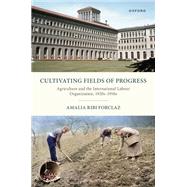Cultivating Fields of Progress Agriculture and the International Labour Organization, 1920s–1950s
, by Ribi Forclaz, Amalia- ISBN: 9780192849892 | 0192849891
- Cover: Hardcover
- Copyright: 6/6/2025
After the First World War, the improvement of working and living conditions in agriculture became an international issue for the first time. Led by the International Labour Organization and related organizations, as well as overlapping expert networks, agrarian interest groups, trade unionists, and farmer representatives, the immediate interwar and post-war years were a fertile time for international debates, knowledge production, and policy-making.
Cultivating Fields of Progress traces the thematic, temporal, and geographical scope of these debates for the first time, from the plight of landless farmworkers in Europe in the early 1920s to the conditions of plantation workers in the 1950s. By using the archives of international organizations, the book considers how and to what ends questions of rural poverty and problematic labour conditions both in Europe and overseas made their way to the world stage, against a backdrop of broader discourses on social progress, decolonizaton, and economic development. Bringing the tools of social history to the study of economic and political history allows for a better understanding of the international development and circulation of ideas and theories of agriculture, as well as broader insights into the nature of power, policy, and knowledge production across a period of global change.
Cultivating Fields of Progress traces the thematic, temporal, and geographical scope of these debates for the first time, from the plight of landless farmworkers in Europe in the early 1920s to the conditions of plantation workers in the 1950s. By using the archives of international organizations, the book considers how and to what ends questions of rural poverty and problematic labour conditions both in Europe and overseas made their way to the world stage, against a backdrop of broader discourses on social progress, decolonizaton, and economic development. Bringing the tools of social history to the study of economic and political history allows for a better understanding of the international development and circulation of ideas and theories of agriculture, as well as broader insights into the nature of power, policy, and knowledge production across a period of global change.






